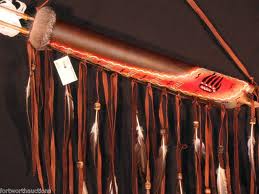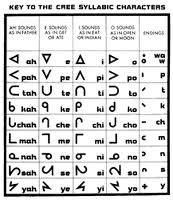Symbolism and Expression Information
Handing Down Cultural Traditions
The acquisition of cultural knowledge is important to all peoples. Before the arrival of Europeans and the imposition of a foreign colonial educational system, First Nations, Métis and Inuit had their own oral educational system, which ensured that children learned the cultural values and history of the tribe, and they had a foundational principle—respect others and live in harmony with the environment.
Both in the past and in the present, Aboriginal parents and grandparents, extended family members and elders have been responsible for passing knowledge to children. Aboriginal cultures are oral, so knowledge is passed down through stories. Children learn about the world around them and about the relationships between human beings and all other living and non-living things. Early in life they learn the importance of knowing who their relatives
are and the value of the kinship system. They also learn manners and respect, and become acquainted with virtues and positive, humanistic qualities, such as love, kindness, honour, generosity and sharing, which they are made to practise throughout childhood.
Children are taken to social and spiritual ceremonies to observe and learn their people’s customs and practices, often taking part in the ceremonies themselves. During certain ceremonies, children are formally introduced and may be given a First Nations name or dance at their first powwow. Community members conduct the ceremonies, passing along additional knowledge about cultural practices. Often children who are musically talented learn the ceremonial songs and the correct drumming techniques and are recruited as valued members of singing groups.
 Traditionally, hunting skills had to be learned. The duty of teaching hunting techniques fell first to the father or to a member of the community who was a great hunter. Boys learned to correctly use their hunting equipment. They were also taught about wild game, the natural world and where animals could be found. Becoming a good hunter depended on the amount of training one received and could take a long time. Proficient hunters were highly valued members of the community. These teachings continue today in many communities.
Traditionally, hunting skills had to be learned. The duty of teaching hunting techniques fell first to the father or to a member of the community who was a great hunter. Boys learned to correctly use their hunting equipment. They were also taught about wild game, the natural world and where animals could be found. Becoming a good hunter depended on the amount of training one received and could take a long time. Proficient hunters were highly valued members of the community. These teachings continue today in many communities.
Mothers and other female members of the community passed homemaking and sewing skills down to the girls. Girls learned how to make clothing and other home products from animals, birds and plants, the raw materials of Mother Earth. They were taught the duties, roles and responsibilities expected
of women. Women are important members of the community and often function as advisors, healers and providers. Women have important positions in some of the spiritual societies in the community.
Knowledge is passed down orally by other members of the community: historians, healers, those responsible for meting out justice, individuals with
special knowledge of the environment, leaders of the social and spiritual societies, and storytellers, especially those familiar with important legends about each nation’s mythological helper to the Creator, Weesakichak (Cree), Naapi (Blackfoot) and Nanaboosh (Ojibwa), whose earthly exploits had moral messages. In other words, education in First Nations, Métis and Inuit cultures was seen as a community responsibility.
 Today, traditional Aboriginal cultures have been largely displaced by modern North American culture. The impact of the change has been so powerful that today many First Nations parents do not know how to speak their traditional languages. The main reason for this is that traditional cultural knowledge was almost lost when children were removed from their homes and placed in residential schools. School authorities strongly discouraged and punished students for using their language and practising their cultural traditions.
Today, traditional Aboriginal cultures have been largely displaced by modern North American culture. The impact of the change has been so powerful that today many First Nations parents do not know how to speak their traditional languages. The main reason for this is that traditional cultural knowledge was almost lost when children were removed from their homes and placed in residential schools. School authorities strongly discouraged and punished students for using their language and practising their cultural traditions.
Nevertheless, there is cause for hope for the survival and revitalization of First Nations, Métis and Inuit cultures and languages today. There are pockets of the Aboriginal population that still have a sophisticated traditional knowledge base. It is through them and a renewed interest in traditional language and culture that a new order will be achieved.